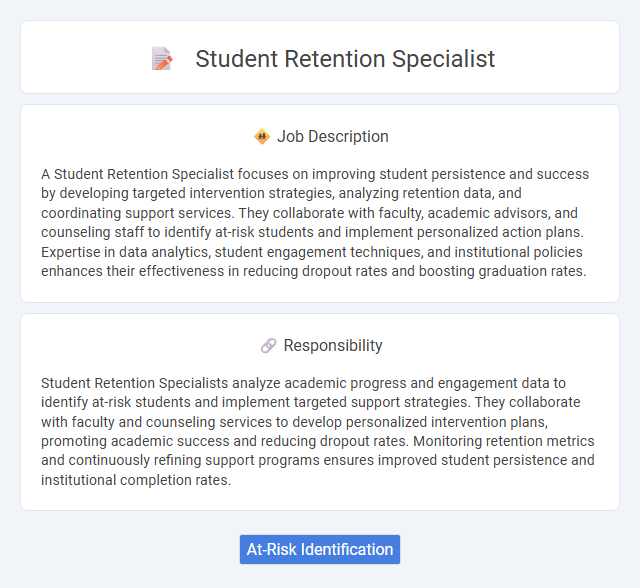
A Student Retention Specialist focuses on improving student persistence and success by developing targeted intervention strategies, analyzing retention data, and coordinating support services. They collaborate with faculty, academic advisors, and counseling staff to identify at-risk students and implement personalized action plans. Expertise in data analytics, student engagement techniques, and institutional policies enhances their effectiveness in reducing dropout rates and boosting graduation rates.
Individuals who are highly empathetic, patient, and possess strong communication skills may be well-suited for a Student Retention Specialist role, as it frequently involves understanding and addressing student challenges. Those who thrive in collaborative environments and are motivated by helping others succeed could likely find this position fulfilling and effective. Candidates who prefer structured problem-solving and are adaptable to diverse student needs will probably excel in supporting student retention strategies.
Qualification
A Student Retention Specialist typically requires a bachelor's degree in education, counseling, or a related field, along with experience in student services or academic advising. Strong communication skills, data analysis proficiency, and the ability to develop intervention strategies are essential qualifications. Familiarity with retention software and knowledge of higher education policies significantly enhance a candidate's effectiveness in this role.
Responsibility
Student Retention Specialists analyze academic progress and engagement data to identify at-risk students and implement targeted support strategies. They collaborate with faculty and counseling services to develop personalized intervention plans, promoting academic success and reducing dropout rates. Monitoring retention metrics and continuously refining support programs ensures improved student persistence and institutional completion rates.
Benefit
Student Retention Specialists likely improve student success rates by providing tailored support and resources, which can enhance overall retention. Their role may contribute to higher graduation rates and increased institutional funding through sustained enrollment. Employing a specialist in this position could also foster a more supportive campus environment, encouraging student engagement and satisfaction.
Challenge
Student retention specialists likely face the challenge of identifying the underlying reasons why students disengage or drop out, which can vary significantly across diverse populations. Meeting the needs of at-risk students may require tailored support strategies that balance academic, emotional, and social factors, creating a complex and dynamic work environment. Successfully addressing these challenges probably demands continuous adaptation and collaboration with faculty, counselors, and other stakeholders to enhance student persistence outcomes.
Career Advancement
A Student Retention Specialist plays a critical role in improving student success by identifying at-risk individuals and implementing targeted support strategies, which enhances institutional retention rates. Expertise in data analysis, communication, and intervention techniques positions professionals for career advancement into roles such as Academic Advisor, Enrollment Manager, or Director of Student Services. Continuous skill development and proven impact on retention metrics significantly increase opportunities for leadership and higher education administration positions.
Key Terms
At-Risk Identification
Student Retention Specialists leverage data analytics and early warning systems to identify at-risk students exhibiting signs such as declining grades, low attendance, or disengagement. They collaborate with academic advisors and support services to implement targeted interventions that improve student persistence and graduation rates. Effective at-risk identification contributes to increased retention by addressing barriers to student success promptly.
 kuljobs.com
kuljobs.com